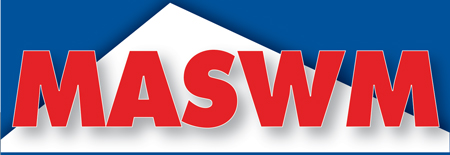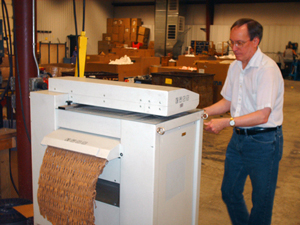
Members | About Workshops | Services for Missourians | News
Dignified and meaningful employment
for people with disabilities

Workshop services provide employment for Missourians and valuable services for local communities.
Workshjops: Where Did They Begin
The history of Extended Employment Sheltered Workshops in Missouri is first of all a story of parents working to provide alternatives for their children.
Extended Employment Sheltered Workshops officially began here with the passage in 1965 of Senate Bill 52. Like many, Frank Ackerman became concerned with what the future held for his child after he finished school. A parent in Sedalia, Ackerman began a campaign to establish a vocational program in Missouri. His campaign resulted in the passage of Senate Bill 52. Sedalia established the first state authorized Extended Employment Sheltered Workshop that same year, and many other communities followed.
Peggy Kutchback, manager of Casco Workshop in Harrisonville, noted that parents were a key to this early formation across the state. "Workshops were first started because the parents of kids with disabilities who left school found that everyone else’s kids went out and worked but there was no place for their kids to go," she recalled. "Workshops provided a whole new outlook for the future for children with disabilities. Now instead of school being the end they could be like everyone else and go on to a job. It was a whole change for their children’s future."
David Hurst, manager of Project Workshop in St. Louis, said Missouri made an important decision with the first workshop legislation. "Senate Bill 52 used a ‘business model’ rather than a ‘medical model,’" he explained. "I think a lot of the country has come around to that. It stresses self-sufficiency and other issues that are important to both individuals and to creating an affordable program."
Kutchback said this emphasis on self-reliance and pride from employment is critical—but often overlooked. "You and I get up every morning and we go do something to contribute to our productivity, to contribute to our ability to survive." she explained. "We consider that a right, an entitlement. It’s just so natural we take it for granted. But there is a whole group of people in our society who did not have that right—people with developmental disabilities. Extended Employment Sheltered Workshops opened the door to productivity for people with developmental disabilities."
Today, there are 93 sheltered workshops throughout the state. These non-profit organizations employ more than 7,500 disabled workers. The state provides about 15 percent of the funding for workshops. Other funding comes from local counties, largely through the later Senate Bill 40 enabling legislation. But the biggest portion of funding comes from subcontract work performed for companies and industries.
The day-to-day operations of the sheltered workshops are managed by local boards—volunteer parents, business leaders and others. The Missouri Department of Elementary and Secondary Education oversees the program statewide. The Department’s Sheltered Workshop Section certifies, regulates, and monitors workshop activities.
Sheltered workshops operate much like any other light assembly or service shop, except that employees are adults whose physical or mental disabilities currently prevent them from competing for traditional employment.
The employees are paid on a piece-rate basis according to their ability to produce, compared with non-disabled workers who would be paid the prevailing wage for the job. Although most workshop employees earn less than the minimum wage, the workshop provides them a place to perform meaningful work and lead productive lives.
Sheltered workshops perform a variety of services for other businesses on a contractual basis. Examples of jobs performed in sheltered workshops are: sorting; collating; labeling; salvage; inspection; folding; mailing; sewing; subassembly; heat sealing; arbor press work; hand packaging; shrink, film, and blister packaging; electrical sub-assemblies; metal punch press operations; painting; manufacture of pallets, fishing lures, wooden craft items, etc. Workshop customers include nationally known companies as well as local companies.
Sheltered workshops have grown tremendously over the past 29 years, but there is much to be done. Those involved would like to see entry into the workshops become easier. Managers are working for better coordination between schools and day activity centers. Workshops are also aggressively promoting competitive employment, with each shop developing or coordinating supported and/or transitional employment programs. Finally, workshops are investigating increased integration of non-disabled workers into the workshops as workshops continue to mature and secure more complex and technical contracts.
MASWM The Missouri Association of Sheltered Workshop Managers
If you have questions, please contact:
President Tim Poepsel – (573) 503-0000 or tpoepsel@empacgroupinc.com
or Legislative Chair Kit Brewer – (314) 647-3300 or cbrewer@cuinc.org